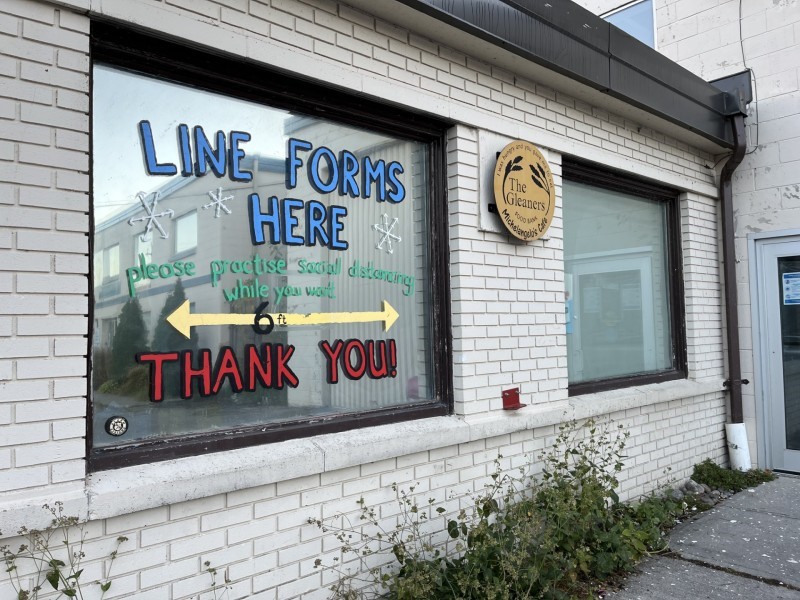
Outside of Gleaners food bank on Wallbridge Crescent in Belleville, Ontario. Photo by Sam Franks
By Sam Franks
BELLEVILLE – The latest Feed Ontario report says the number of Ontarians relying on a food bank has increased by 41% since 2019-2020.
That’s put overwhelming stress on these organizations and on the people who use them.
“In Kingston we help between 80-100 households a day with food. Monday to Friday so that’s as many as 2,000 households a month,” said Dan Irwin , executive director of the Partners in Mission food bank in Kingston.
Irwin says the food bank is helping 11% more Kingston citizens than it was a year ago and there’s been a 45% increase in usage since 2020.
QNetNews has been looking at the numbers in the Feed Ontario report and examining what that means for area food banks and the people who use them.
Irwin says that more people needing them means the food bank needs more funding and supplies to meet the demand.
Irwin said that in five years their budget has increased by $1 million.
Irwin says the community has always been generous to the food bank so they are able to keep up with the increased demands and increased costs at the moment.
“The biggest pressure we’re facing now is really driven by the increase in costs for everything. Our costs have increased and the general publics costs have increased,” Irwin said.
“We have seen fewer small donations so where we used to get a maybe $25 donation – those have dried up a lot.
One food bank user Ryan L., 41, from Trenton has been using food banks since he was 18-years old.
Ryan is on Ontario Disability Support Program (ODSP) and has to carefully plan how to spend his cheque.
“That was pretty funny when either the Liberal or the Conservative government came out and said, “people need $2,200 a month just to survive and live comfortably.” I was looking at my pay stub only getting $1,200 a month, like yeah how do you fall under that average,” Ryan told QNetNews.
Ryan said every month he is forced to decide between bills or food.
“It’s an endless cycle because I have a credit card so when I think I’m doing good and I then look at all my finances and then I realize well, I’m not really doing as good as I thought I was, but maybe next month,” Ryan said.
In previous years he was able to occasionally donate $20 to his food bank but those days are now gone.
Ryan has noticed some changes at his food bank over the years.
“You used to get more at the food bank but now that seems to be a smaller number as they’re non-profit and literally run on fumes,” Ryan said.
The report from Feed Ontario says, 69% of food banks are concerned with the ability to support their clients.
Another client, Roger C., 70, says he’s noticed changes when he makes his monthly visit.
“People can’t afford to donate the way they used to. Other people are saying they can only get two days worth of food from the food bank. They don’t stretch it out like I do,” Roger said.
Roger says since he first started using food banks he’s noticed some changes in supplies.
“I used to get things like milk and often get meat. Now it’s a lot of cans, boxed food, soup, pasta. Which is great, but they don’t sustain or go as far as it used to.”
Roger says he’s adjusted his diet to one meal a day.
“I don’t make much money. I appreciate the food banks but I can’t afford the store anymore,” Roger said.
Roger says he’s noticed more hygiene and home products that were unfamiliar to when he first visited a food bank.
Another long-time visitor is Shaun, who asked his last name not be used.
He uses the food banks every six to eight months but finds there is a lack of options.
“In the past you might be able to go there and get enough help, once a month, to get you through say half a week or so. Now they rarely have the basics anytime I’ve had to go,” Shaun said.
Shaun explained that before he would get a protein source and a bag of milk regularly, but now mostly receives canned goods or other non-perishable items.
“They have to save that stuff for families with children now because there’s so many people going. I recall in the past making an appointment for the food bank, you’d go there and show up for the appointment and now if you go there’s a line-up of people,” Shaun said.
Shaun is grateful he moved into subsidized housing and does not need to rely on the food banks as frequently.
“I can afford my groceries now. I have to follow a very strict diet. I have to watch what I eat. I can now afford to do that because I’m finally in subsidized housing,” Shaun said.
Shaun believes that the government needs to take action before the problem gets worse.
“Everybody is struggling and it’s breaking them right now. People are overwhelming places like the food banks and they’re not able help people at the same level they could before,” Shaun said.
Feed Ontario reports that five of their food bank members might have to permanently close.
Dan Irwin assured QNetNews the Partners in Mission food bank is able to maintain the demand.
“I am concerned like most of us in food banking that at what point do we have more people needing than who can support us,”
 Print This Post
Print This Post






